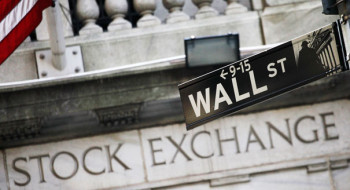$30M Patrick Byrne deal bridges gap between bitcoin technology and Wall Street
Patrick Byrne, founder and CEO of Overstock.com
Patrick Byrne, the founder of Overstock.com, today announced the acquisition of a broker-dealer firm built deep into the DNA of Wall Street. When the technology at the center of the acquisition is switched on, Byrne said, it will mark the first time the decentralized ledger behind bitcoin is plugged directly into Wall Street.
“Basically, it’s the wormhole. It’s the connection between the two universes,” Byrne told the New York Business Journal in a phone call today. “All the stuff we’ve built can now be accessed directly by people with a Bloomberg terminal, people with an eTrade account.”
What Byrne acquired, through Overstock.com’s settlement platform subsidiary, Medici, doing business as TØ, is the company Speedroute. According to an SEC filing, SpeedRoute was purchased for approximately $30.3 million, consisting of approximately $11 million in cash and 900,000 shares of Overstock’s common stock valued at $19.3 million.
While the majority of the deal closed today, some assets remain subject to regulatory notification requirements. SpeedRoute and its related companies will be held within the Overstock subsidiary, in which Overstock’s ownership stake increases to 81 percent. The official buying company in the SEC documents, Cirrus Services, is a subsidiary of tØ set up for this acquisition, according to a representative of the company. TØ already owned a 25 percent stake in SpeedRoute.
An SEC form X-17A stamped March 2, 2015 lists Speedroute’s assets, including cash and commission receivables, valued at $3.18 million. As of the end of 2014, the company had net capital of $1,455,000 which was $1,352,757 more than the net capital required by the government. Overstock is currently valued at $484.1 million, trading at $19.98 per share.
Founded in April 2000, SpeedRoute LLC, which was already partially owned by TØ, is a brokerage firm, or broker-dealer, that buys and sells stocks, bonds, mutual funds, and other investment products on behalf of its customers, according to the website of the Financial Industry Regulatory Authority (FINRA). The firm, which has offices at 14 Wall Street, moves approximately 2.5 percent of U.S. equity order flow, according to the Overstock statement.
“This collaboration allows Overstock to enter this new financial technology arena with a speed and aggression that I believe will revolutionize Wall Street, while adding an already profitable and cash-flow positive business right to Overstock’s bottom line,” SpeedRoute CEO Joseph Cammarata said in a statement. “The winners are going to be investors and regulators alike.”
Since at least the time TØ bought its initial stake in SpeedRoute, the company has been experimenting with building its securities into the blockchain technology behind bitcoin. “What that does is it’s now a pipeline, more than a pipeline, a bridge for everything we’ve built,” Byrne told me. “Everything we’ve built in the crypto-world can now be accessed directly in the conventional national market system.”
Among TØ’s potential competitors is New York City-based Symbiont, which similar to the Overstock subsidiary, is building on the bitcoin blockchain. But in a departure from TØ, Symbiont is building “smart” or self-executing securities which embed processes in the software. Another competitor, Blythe Masters’ Digital Assets Holdings, has been quiet about many of the details of its operation, but based on recent acquisitions seems to be preparing to build on a different blockchain, or even a series of blockchains.
Byrne’ battle to increase transparency on Wall Street goes back at least to 2005, when he told a group of investors on a phone call that financial insiders were exploiting a loophole to make millions of dollars off companies like his own, according to a Wired report last year. So it is no surprise that at T0’s launch earlier this month he said he wants to close that opening by ensuring security loans which are promised to be made, are actually made. At the launch he said the technology could save between 80 percent to 90 percent on systemic costs due to the loophole.
In our phone conversation today, the Overstock CEO said that Wall Street settlement technology built on blockchain technology is not only more robust that traditional platforms but eliminates counter-party risk. In the case of the Wall Street’s latest woes, which saw the NYSE drop 531 points Friday and another 588 points on Monday, Byrne says that by trading actual stocks instead of just contracts for stocks as is now the case, the chance of such large market fluctuations decreases dramatically.
“When you have things like the Flash Crash and you have these enormous spikes in volatility, one starts wondering what’s actually trading. Is this a market as we understand it?” said Byrne. “Or is this a bunch of technologies speaking to each other that people have figured out how to game? All of that gets stripped away in a public ledger. All of that gets stripped away with a crypto-ledger.”
Throughout September, Byrne plans to slowly turn out different modules enabling the trade of a range of securities his company has been building. He said he expects the first of these modules to be available by early September and would be accessible from Bloomberg terminals.
Via: http://www.bizjournals.com/newyork/news/2015/08/26/patrick-byrne-deal-overstock-bitcoin-wall-street.html


